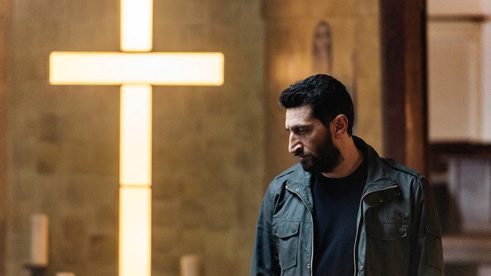Scandinavian Film Festival 2017
A Conspiracy of Faith: Cold cases break boundaries

Crime knows no boundaries in the Department Q films. Time, location, culture: on screen, none can thwart perpetrators committing horrific acts or stop the police pair charged with hunting down cold cases; off screen, they can’t dampen enthusiasm for the franchise’s page-to-screen adaptations either.
Indeed, the inability to constrain humanity’s darkest urges is a fitting ongoing theme in a series predicated upon evil-doers reaching beyond the accepted borders of society, and following cops doing whatever it takes to right or redress their wrongs, as proves true in A Conspiracy of Faith. Once again immersed in a murky situation, Carl Morck (Nikolaj Lie Kaas) and his colleague Assad (Fares Fares) continue to defy limits and expectations, as does the latest crime they’re investigating.
BELIEF THRUST INTO THE SPOTLIGHT
In this Danish-German-Swedish-Norwegian effort — a European co-production like its predecessors The Keeper of Lost Causes and The Absent One, with the series’ multi-country origins also evidence of its lack of care for traditional bounds — the concept of belief is thrust into the spotlight. It’s used to help a stranger (Pal Sverre Hagen) gain access to close-knit religious communities and families, to lure child victims and silence the parents left behind, and to cast doubt on a literal message in a bottle left as a cry for help. When the eight-year-old scrawl finds its way to the detective duo, Morck and Assad are quick to act, but they’re swiftly hindered as well. Even after their probing leads to the discovery of a fresh abduction currently underway, it’s their belief in their own theories and skills that sustains the search, as well as their ability to push boundaries. In the latest 'Department Q' film Carl Morck (Nikolaj Lie Kaas) and his colleague Assad (Fares Fares) continue to defy limits and expectations
| © A Conspiracy of Faith
Since first arriving on cinema screens in 2013, riding a wave of frenzy for Scandinavian noir that still shows no signs of abating, the Department Q films have taken several formulas, run with them and plundered them for hidden depths. Like its genre, it’s an approach that keeps reaping rewards, largely courtesy of its exploration and adoption of a limit-breaking mindset. In all three features, it’s easy to spy the familiar elements lurking within their midst, from the odd-couple central duo and their status as outsiders among their police brethren, to their procedural investigative antics and the material’s penchant for intertwining their year-hopping stories by flitting across time periods. And yet, it’s also easy to see how the films are toying with the usual aspects to present something more than standard.
In the latest 'Department Q' film Carl Morck (Nikolaj Lie Kaas) and his colleague Assad (Fares Fares) continue to defy limits and expectations
| © A Conspiracy of Faith
Since first arriving on cinema screens in 2013, riding a wave of frenzy for Scandinavian noir that still shows no signs of abating, the Department Q films have taken several formulas, run with them and plundered them for hidden depths. Like its genre, it’s an approach that keeps reaping rewards, largely courtesy of its exploration and adoption of a limit-breaking mindset. In all three features, it’s easy to spy the familiar elements lurking within their midst, from the odd-couple central duo and their status as outsiders among their police brethren, to their procedural investigative antics and the material’s penchant for intertwining their year-hopping stories by flitting across time periods. And yet, it’s also easy to see how the films are toying with the usual aspects to present something more than standard.
MORE THAN JUST STANDARD CRIME TROPES
Take the quintessential eccentric cop who doesn’t play well with others, for example. Morck has always been the series’ grumpy poster child, personifying its fondness for displaying but defying strictures. Rather than nurturing the character’s growth and evolution over the span of successive films, Lie Kaas’s portrayal has embraced the notion that an anti-social exterior needn’t be incompatible with empathetic actions, even though the opposite oft appears to be the case. Breaking the typical antihero parameters can be as simple as eschewing plotting a course for overt development, and instead embracing the multitude of traits already present within the character, while still leaving his gruff personality intact. As a result, the same internal factors that initially motivated Morck to accept his partnership with Assad in The Keeper of Lost Causes prove the same reasons that he nonchalantly makes his feelings known in A Conspiracy of Faith when a religious couple demonstrates prejudice against Assad’s Muslim culture. In this Danish-German-Swedish-Norwegian effort the concept of belief is thrust into the spotlight
| © The Conspiracy of Faith
Accordingly, it never feels less than fitting that Morck and Assad’s third cinema outing (based on Jussi Adler-Olsen’s third book in the series, with a fourth film currently in development and four other novels in print) places faith at the centre of its latest rule-breaking detective drama. Crime doesn’t hew to expectation, yet even when those forced to play its game seem to, it’s their belief in themselves, not any ostensible willingness to ascribe to convention, that emerges victorious. Coming to the franchise after the blackly comic gangster feature In Order of Disappearance, director Hans Petter Moland ensures his frames match the movie’s attitude, with A Conspiracy of Faith bleak in its kidnapping contents but bright in its images. Subversive though straightforward it’s a touch that has the desired impact; in story, theme and style, conviction shatters the routine once again.
In this Danish-German-Swedish-Norwegian effort the concept of belief is thrust into the spotlight
| © The Conspiracy of Faith
Accordingly, it never feels less than fitting that Morck and Assad’s third cinema outing (based on Jussi Adler-Olsen’s third book in the series, with a fourth film currently in development and four other novels in print) places faith at the centre of its latest rule-breaking detective drama. Crime doesn’t hew to expectation, yet even when those forced to play its game seem to, it’s their belief in themselves, not any ostensible willingness to ascribe to convention, that emerges victorious. Coming to the franchise after the blackly comic gangster feature In Order of Disappearance, director Hans Petter Moland ensures his frames match the movie’s attitude, with A Conspiracy of Faith bleak in its kidnapping contents but bright in its images. Subversive though straightforward it’s a touch that has the desired impact; in story, theme and style, conviction shatters the routine once again.
'A Conspiracy of Faith' screens at the Scandinavian Film Festival 2017 at various locations throughout Australia. For screening locations and times, please check 'related links' on the right column.